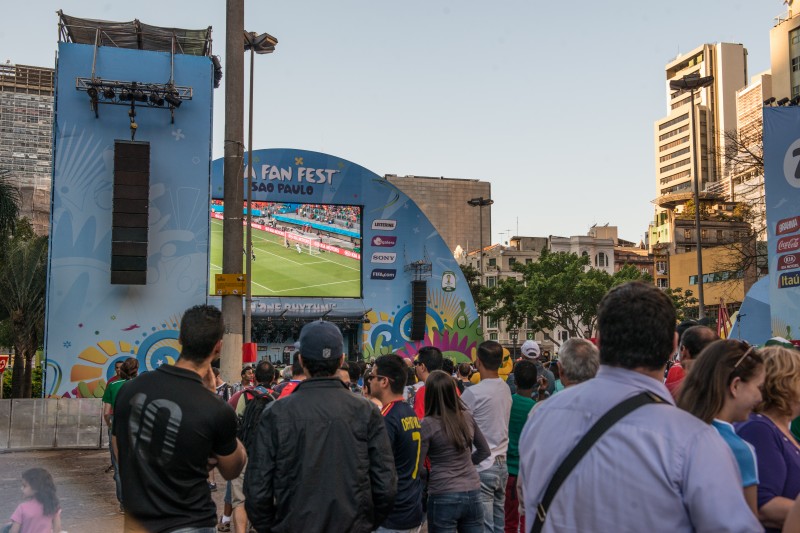
Fans watch group matches at FIFA Fan Fest in Sao Paulo on the second day of the 2014 FIFA World Cup. Photo by Julia Reinhart. Copyright Demotix.
As with other major sporting events, fans around the world will be glued to the TV – whether at home, a local community centre or a restaurant – watching their team and others battle it out in the FIFA World Cup in Brazil.
The story's no different in Africa (five African teams have qualified to play in the World Cup), but some fans on the continent might have a more complicated time tuning in, thanks to legal battles and network choices.
Thinus Ferreira, a South African blogger on news and analysis on South African TV, observed the challenges faced by viewers and TV providers on his blog TV With Thinus. In Kenya, he explained the telecast drama between Chinese-owned StarTimes, which has been accused of illegally hijacking a Kenya Broadcasting Corporation (KBC) signal of the World Cup:
StarTimes and Wananchi using the FIFA content on its pay-TV platforms, have allegedly breached the licence agreement between KBC and FIFA. KBC says that the two pay-TV operators broadcasting its signal of the 2014 FIFA World Cup matches it secured, will jeopardise its business since viewers won't feel compelled to tune in to KBC for the exclusivity it paid for. StarTimes allegedly went as far as hacking into KBC's terrestrial TV feed and pirating that signal to broadcast 2014 FIFA World Cup coverage on its pay-TV platform to not just viewers in Kenya but also in Uganda and Tanzania.
Two million viewers in Kenya tuned for the first two days of the World Cup, according to data research company GeoPoll.
CIPIT Law Blog, through the Strathmore University's Centre for Intellectual Property and Information Technology Law, argued that Kenya must do what it can to stop digital piracy of FIFA's matches.
In Zimbabwe and Namibia, fans hoping to watch World Cup matches through satellite pay-TV MultiChoice are out of luck. The company has blacked out the two country's broadcasting corporations on its digital satellite TV (DStv) service, Ferreira wrote:
These broadcasters legitimately secured the FTA rights to the 2014 FIFA World Cup matches in their respective countries.While viewers can now see Zimbabwe Broadcasting Corporation (ZBC) and Namibia Broadcasting Corporation (NBC) as terrestrial channels (only) during the soccer, their signals on DStv are terminated. On 11 June, right before the 2014 FIFA World Cup started, MultiChoice Africa suddenly sent this letter (right) (click to enlarge) to public broadcasters across Africa, like KBC and NBC in Kenya and Namibia, explaining why FTA (free-to-air) channels showing soccer World Cup matches on DStv will be going dark and will be blacked out.
Tell us about your experience. Have you had a hard time watching the World Cup on TV?







1 comment